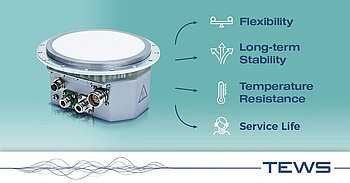How innovation drives performance development of our equipment

- Long-term stability
- Flexibility
- Temperature resistance
- Service Life
At TEWS, the focus is on innovation - which is why our sensors are always being continuously developed. If you compare a TEWS sensor from 2012 with one from 2020, you will not initially see any serious differences. Inside the instruments, however, a lot has changed - the performance parameters have changed and improved over time.
So what exactly makes our TEWS sensors so special and how do our customers benefit from this performance development?
TEWS microwave technology can be used to measure the moisture and density of, for example, paper or capsules over a certain range. Over the years, four performance parameters have emerged that we are continuously working on.
- Long-term stability
Before the moisture or density of a product can be measured, a blank calibration must be performed. During "zeroing", the measured values are "tared" and then the correct values are displayed. For laboratory instruments this can be done without any problems, but for process instruments it is not possible to simply stop the complete production process. The measured values must be inherently stable and the drift must be compensated and kept as small as possible.
Over the years, we have optimized our sensors so that the drift is kept minimally small - the sensors are very stable. This has the advantage for the customer that an empty calibration does not have to be carried out every day, but only once a month. This saves a lot of time and money.
- Flexibility
TEWS sensors meet the highest requirements for flexibility. They can be used in a wide variety of applications. Even after 30 years, we are often surprised ourselves at the measurement problems for which our devices are suitable. Would you have thought that it is important to measure the moisture of human hair? Or the zipper of plastic bags? Or the density of yarn? We have a portfolio of more than 50 sensors from which we select the right sensor for each customer's needs and customize it as needed.
- Temperature resistance
The temperature limit, which used to be 70 degrees, could be raised to as high as 120-140 degrees for TEWS sensors. This much higher temperature range opens up new areas of application and uses for the sensors.
- Service Life
The service life of the sensors has increased 3-4 times over time. This can be explained by the fact that the material surrounding the ceramic sensors has changed. Very hard stainless steels are used for TEWS sensors, which greatly increases the resistance of the sensors.
Our powerful instruments deliver precise results. By analyzing the moisture or density values, conclusions can be drawn to optimize your processes. To achieve this goal we need to bundle our clients' experiences together with ours. We are convinced that only if well-founded knowledge, practical experience and strong resources come together, better solutions will be the result.
Contact Ingmar.Brauer@tewsworks.com to get more information!